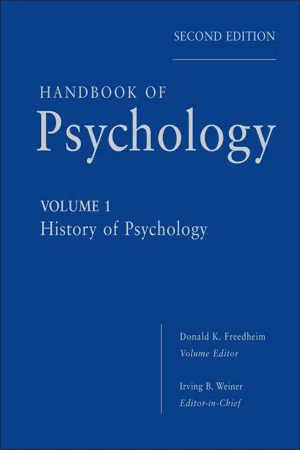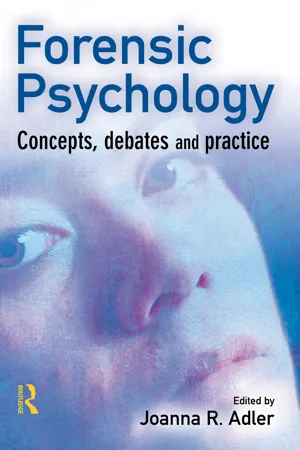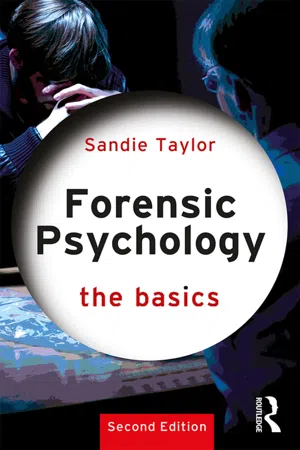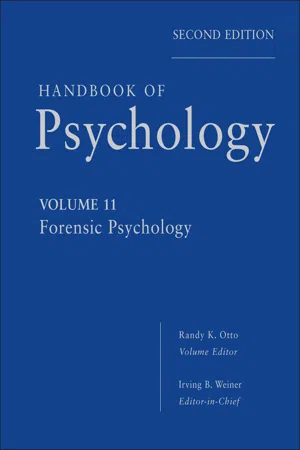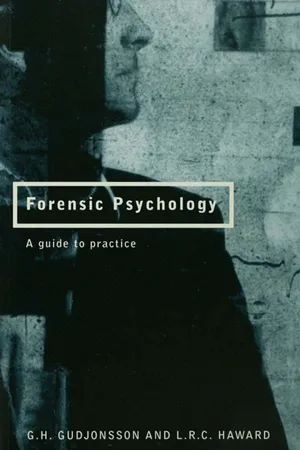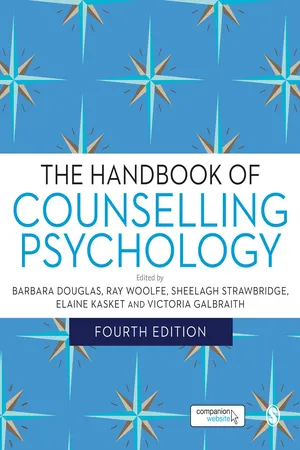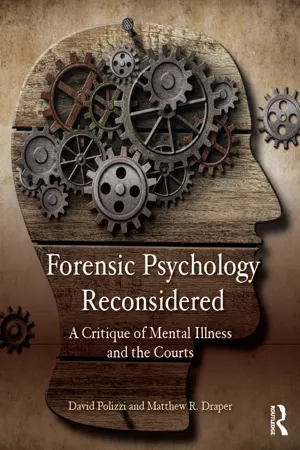Psychology
Forensic Psychology
Forensic psychology is the intersection of psychology and the legal system. It involves applying psychological principles to understand and address legal issues, such as criminal behavior, mental competency, and the impact of trauma on victims and witnesses. Forensic psychologists may work in various settings, including courts, correctional facilities, and law enforcement agencies, providing assessments, expert testimony, and therapeutic interventions.
Written by Perlego with AI-assistance
Related key terms
11 Key excerpts on "Forensic Psychology"
- eBook - ePub
- (Author)
- 2012(Publication Date)
- Wiley(Publisher)
Chapter 19 Forensic Psychology Thomas Grisso and John C. Brigham Early Attempts to Apply Psychological or Psychiatric Knowledge to the Legal System Maturation of Forensic Psychology as a Recognized Subfield Historical Perspective on Forensic Psychological Science Forensic Psychology's Development in the 21st Century ReferencesThere are two ways to ask the question, “What is Forensic Psychology?” One is to inquire about its current boundaries, and the other is to ask when it began. Both questions can be answered with a broad or a narrow perspective. Concerning what Forensic Psychology is now, one perspective takes a broad view, equating the field roughly with what is often termed psychology and law. Consistent with this broad perspective, we can note that forensic comes from the Latin forum (a place of assembly, a court of law) and is defined as “pertaining to or employed in legal proceedings or argumentation” (American Heritage Dictionary, 1982).This broad definition is contained in the newly revised Specialty Guidelines for Forensic Psychologists (www.ap-ls.org/aboutpsychlaw/SGFP_Final_Approved_2011 ):Forensic Psychology refers to professional practice by any psychologist working within any sub-discipline of psychology (e.g., clinical, developmental, social, cognitive) when applying the scientific, technical, or specialized knowledge of psychology to the law to assist in addressing legal, contractual, and administrative matters.The second definition of Forensic Psychology is more circumscribed and more focused on regulating applications of psychology in clinical forensic practice. Many psychologists define Forensic Psychology more narrowly to refer to clinical psychologists who are engaged in clinical practice within the legal system. The distinction here is between psychologists who bring scientific information to the courts for their consideration in cases and psychologists who evaluate individuals and testify about them in reference to a legal question. The American Psychological Association's (APA) Committee on Specialties uses a definition of Forensic Psychology that employs this clinical emphasis (APA Committee on Specialties: http://cospp.org/specialties/forensic-psychology - eBook - ePub
- Joanna R. Adler(Author)
- 2013(Publication Date)
- Willan(Publisher)
In many parts of the world today, it is possible to find psychology being practised with a forensic twist. Forensic psychologists evaluate offender behaviour programmes, design risk assessments, aid investigative processes, support victims, provide treatment and generally try to facilitate justice. Psychological testimony is now fairly commonplace in the courts themselves. It may be given in cases ranging from the prosecution of war crimes to an adoption hearing. Most people would concur that Forensic Psychology is a discipline concerned with providing psychological information to people, agencies and systems, involved directly and sometimes indirectly, in the implementation of justice (Dushkind 1984). There are some who define Forensic Psychology more narrowly, as work provided solely for use by the courts (Gudjonsson and Haward 1998). This definition is based on a literal reading of the word ‘forensic’ but is not that which has been adopted in practice in this country.Whether the broader or more circumscribed definition is followed, there are no particular skill sets that definitively separate a forensic psychologist from any other type of psychologist. Rather, it is the context within which we practise and apply our knowledge that makes it forensic (Blackburn 1996). For those practising as forensic psychologists, licensing or statutory registration are relatively recent innovations. The American Psychological Association and the British Psychological Society each have divisions concerned with Forensic Psychology, that were only fully established within the last 30 years. In England and Wales, Statutory registration for all chartered psychologists, irrespective of type, is still in the legislative process of becoming a reality. At the moment, protection of the British public is largely self regulatory.Within the British Psychological Society, the Division of Forensic Psychology is also currently engaged in protracted debate as to how people should best acquire and demonstrate necessary knowledge and skills for full membership. In part, the debate reflects individuals’ very different understandings of what makes a forensic psychologist. In part, it is a debate as how best to interpret competency based criteria that were painstakingly drawn up over years of consultation. As the borders come down across the European Union and its membership expands, professions are expected to make welcome their compatriots from elsewhere in the confederation of states. Differences in training, practice and professional expectations have the potential to cause border disputes along the parameters of a discipline and to endanger the public through mismatches in expectations and needs. - eBook - ePub
- Sandie Taylor(Author)
- 2019(Publication Date)
- Routledge(Publisher)
1 Forensic Psychology AND THE ROLE OF THE FORENSIC PSYCHOLOGISTInterestingly, the word ‘forensic’ derives from the Latin word forensis , which when translated into English means ‘of the forum’ – the central area of ancient Rome where the city’s law courts were held. Since then, the term ‘forensic’ has evolved to include scientific principles and practices applied within a legal context, and as such is a recognised specialised area that links psychology and law. An excellent way of introducing what Forensic Psychology entails and what a forensic psychologist does is by using the example of a personal account, in this case practising forensic psychologist Dr Eric Mart.DR ERIC MART SPEAKSForensic Psychology is a speciality area of applied psychology. Forensic psychologists work at the intersection of the legal world and clinical psychology. They provide assessments and expert testimony in a variety of types of cases and some also provide court ordered treatment in clinics and prisons. I work in a variety of forensic areas, but much of my practice involves evaluating persons accused of criminal offenses to see if they are competent to stand trial, evaluating defendants to see if they are legally insane (not guilty by reason of insanity) and evaluating convicted sexual offenders to see if they are eligible for commitment as sexually violent predators. I also perform personal injury, child custody, and fitness for duty assessments.(Cited by McKay and McKay 2009)What should be immediately apparent to the reader is the diversity of work carried out by forensic psychologists. Much of this work arises out of the core areas taught in most Forensic Psychology courses. These core areas include: - eBook - ePub
- Helen Gavin(Author)
- 2018(Publication Date)
- SAGE Publications Ltd(Publisher)
There are various specialisms within the broad field of psychology, and Forensic Psychology is one of them, and, if the use of it in drama is anything to go by, one of the more fascinating. The word ‘forensic’ is from the Latin term forensis, meaning ‘of the forum’, because Ancient Rome’s forum was where the law courts were held. We now refer to forensic sciences as the application of scientific principles to the adversarial law process. Forensic Psychology is the application of psychology to the legal process. Criminological psychology is an approach to studying crime that provides a critical evaluation the core areas of Forensic Psychology, criminology, victimology, and psychology in the criminal justice system. Where does such terminology leave Forensic Psychology? Forensic Psychology is strictly the term describing the application of psychology to the legal process, and it has a long, long history. It holds a special relationship to other fields of study, such as criminology, law, and medicine, and the ways in which those relationships influence research and practice culminate in a growing understanding of crime. History of the Use of Psychology in the Study, Investigation, and Punishment of Crime The relationship between psychology and the legal system is an ancient one. The Greek philosopher Aristotle stated, in his books Nicomachean Ethics, written around 340 bc, that a person should only be considered morally responsible for a criminal act if he has knowledge of the circumstances and acted without external compulsion. Hence a crime is only punishable if the character of the offender is under his own control (Pakaluk, 2005). A seemingly enlightened view for more than 23 centuries ago, such philosophical positions took many years to be incorporated into any form of legal system, and this history is littered with what to modern eyes appears to be injustice - Carla Willig, Wendy Stainton Rogers(Authors)
- 2017(Publication Date)
- SAGE Publications Ltd(Publisher)
After extensive debate it was felt within the discipline that there was a need to present a more distinctive image with a greater emphasis on psychology and on ‘science', and so the Division changed its name to the Division of Forensic Psychology in 1999, with a more overt focus on ‘Forensic Psychology'. The word ‘forensic’ historically goes back to the Latin word ‘forum', which came to mean ‘in open court’ and more recently ‘of the courts', referring specifically to psychology being involved with legal decision making, including expert witness advice in courts, fitness to plead and evaluating eyewitness testimony. In some countries Forensic Psychology is seen as being limited to these areas, but in the UK and elsewhere the term has been taken to be broader than this, being concerned with not only the application of psychology to court settings but also to the care and treatment of criminals. The Division exists to represent the interests of those psychologists who work in the Criminal and Civil Justice Systems (and not just the Courts).It is interesting to note that although there has been this change in the name of the Division, the leading BPS journal in this area still goes under the title of Legal and Criminological Psychology. This title implies that articles published are from diverse sources in terms of methodology and discipline, but in practice the majority of articles printed in this journal and other journals published in the general area of Forensic Psychology utilise quantitative paradigms. A perusal of the last four years of publication of this key journal reveals there to be a relatively large number related to topics such as eye witness testimony and court procedures, with some on treatment and more specialist areas such as stalking and the Internet. Very few of the published papers specifically use qualitative methods; despite this (as will be spelt out below), articles may include qualitative elements, sometimes acknowledged and at other times more implicit.Division membership thus includes forensic psychologists working in academic settings, prison services, mental health, health, education, privately and social services. Most forensic psychologists in the UK are employed in prison, probation and mental health contexts, where they may be involved in such areas as testing and treating people, running and supervising group programmes and helping the management. Substantial numbers, however, act as consultants to the police in the detection of criminals and in court settings as expert witnesses. In addition, they may be involved in the training of police, probation and prison officers. Many are employed in research settings, typically in Higher Education Institutions but also in bodies such as the Home Office Science Group, which brings together scientists, researchers and analysts. Like other areas of applied psychology, the forensic psychologist is often needed to provide concrete advice to courts or in institutional settings to deal with actual current problems in real-life settings, the emphasis being on pragmatic outcomes and ongoing situations rather than theoretical developments. Over the recent years there has been a substantial growth in Division membership, which now stands at around 3000 in total.- eBook - ePub
- Irving B. Weiner, Randy K. Otto(Authors)
- 2012(Publication Date)
- Wiley(Publisher)
An expertise that is in particular demand at present involves violence risk assessment. Forensic psychologists provide consultations to other practitioners, agencies, and the legal system regarding assessing risk of violence. This involves not only providing risk assessments, but also consulting on the appropriate use of specialized tests and actuarial instruments. With increasing public concern about school shootings, workplace violence, and sex offending, there is increasing demand for clarity about the reliability, validity, and generalizability of approaches to violence risk assessment (e.g., Borum & Verhaagen, 2006; Heilbrun, 2009; Otto & Douglas, 2010; Witt & Conroy, 2009).As is evident from this discussion, the practice of Forensic Psychology spans a wide range of populations, including young children, adolescents, families, the elderly, people with severe mental illness, and offenders. Accordingly, with regard to training, a forensic specialist should begin with a strong foundation of general clinical training and skill development. Although forensic training involves specialized knowledge and skills (described next), these applications require a foundation of clinical competence in understanding psychopathology, assessment, case conceptualization, and other general clinical skills. This is analogous to the sequence for legal psychologists, who first must develop foundational competencies and then subsequently apply these to the legal area of specialization.One who engages in the practice of Forensic Psychology, however, may not necessarily have competence or expertise with all populations and in all areas of forensic practice. For example, psychologists who have been trained primarily to work with children, adolescents, and families may learn to apply their knowledge in child custody cases but may not have the requisite background to assess testamentary capacity in adults whose decision-making ability may be impaired. In some instances, however, the population may be more specific to the forensic arena; one obvious example of this is forensic work with adult offenders. Unless a psychologist has trained in a correctional or forensic setting, for example, he or she may not be familiar with, or competent to assess, defendants who have psychopathic traits. Therefore, training in Forensic Psychology needs to focus both on understanding the appropriate clinical population as well as on gaining the specialized legal knowledge and skills in forensic methodology. - eBook - ePub
- Irving B. Weiner, Randy K. Otto(Authors)
- 2013(Publication Date)
- Wiley(Publisher)
academic. Law is an applied discipline, and it is designed to deal with real-world problems. The players within the system (e.g., lawyers, parole officers, etc.) have clearly defined roles that prescribe the issues on which they will concentrate. In contrast, similar to the distinction noted previously, psychologists have considerable say over the issues they pursue. The driving force tends to be more of a quest for knowledge for its own sake (i.e., for academic reasons rather than for purely pragmatic reasons).With these eight tensions in mind, included in what follows is an expansive survey of what can be characterized as Forensic Psychology. At a macro level, forensic psychologists can assist the legal system in four ways: (1) providing legal decision makers with information about complicated matters that they would not otherwise have, (2) assisting specific legal actors, (3) researching the legal system and its operation, and (4) researching psychological phenomena that are of particular interest or relevance to the legal system.Psychologists Assisting the Legal System
Psychologists assist the legal system in a number of ways including providing expert testimony in legal, administrative, and legislative proceedings; conducting and testifying about research conducted in anticipation of litigation; testifying about research not conducted in connection with litigation but that is nonetheless relevant; and researching the legal system's operation.Informing Decision Makers in Legal, Administrative, and Legislative Proceedings—Expert Testimony
Every day in the United States and other countries, thousands of psychologists appear before and provide expert opinions to courts, administrative proceedings (e.g., parole boards), attorneys, and legislative hearings via reports and/or sworn testimony. Psychologists' involvement in these matters is predicated on the assumption that their observations and opinions will educate the recipient (e.g., attorney, judge, jury) about some psychological phenomena that are relevant to the legal matters in dispute, and, as a result, a more accurate and presumably better decision will be made. - eBook - ePub
Forensic Psychology in Context
Nordic and International Approaches
- P.A. Granhag(Author)
- 2017(Publication Date)
- Willan(Publisher)
This rapid development is mainly positive, but also calls for reflection. A number of questions are raised, for example: To what extent do the questions addressed by today’s researchers mirror the concrete problems that practitioners have to tackle? To what extent are the findings emerging from research programmes designed with one particular legal system (procedure) in mind informative also for different legal systems (procedures)? That is, how do we translate research findings across different investigative or legal procedures? It is true that science should be global – not local – but it is equally true that scientific findings need to be contextualised and situated in order to be applicable and make a difference. In order to conduct meaningful applied psychological research one needs to know about the structure, frequency and consequences of real-world problems; if not, one runs the risk of producing solutions desperately seeking their problems. The overarching goal for the present volume is to cast a Nordic light on Forensic Psychology. Below we will sort out why we consider this task important, as well as how we went about achieving this goal. But before this, a few words on definition and on some of the trademarks characterising research on forensic (legal) psychology are warranted.For the present volume we think it suffices to say that forensic (legal) psychology is mainly occupied with: (1) conducting psychological research in order to gain scientific knowledge relevant for the legal system; and (2) the implementation and application of such knowledge (for a detailed discussion on different definitions see Ogloff, 2002). To further illuminate what forensic (legal) psychology is about it might help to reflect on the objects under examination. Simply put, it is possible to identify two main objects of study: (1) the actors within the legal arena (e.g. police officers, judges, victims and eyewitnesses); and (2) the procedures, techniques and tests used by legal practitioners (e.g. interview techniques and methods for assessing reliability). The distinction between different objects of study makes it, in turn, possible to chisel out two major lines of psycho-legal research. The first line is to a large extent descriptive and aims at describing different ‘states of the (legal) world’. Two examples of questions emerging from this line of research are: (1) how well do witnesses remember emotional events; and (2) which biases are legal fact-finders exposed to when assessing the strength of the evidence in court? The second line of research is to a large extent normative in its nature and can be said to have two major aims: to provide ‘prescriptions’ for legal practitioners (e.g. ‘the best way to interview a witness is to . . .’), or to warn against faulty practice (e.g. ‘interrogation tactics like “maximisation” and “minimisation” might increase the risk of false confessions’). Two examples of questions illustrating this second line of research are: (1) how effective is the cognitive interview when used for children; and (2) how should a line-up be administered in order to satisfy the most central criteria of objectivity? - eBook - ePub
Forensic Psychology
A Guide to Practice
- G.H. Gudjonsson, L.R.C. Haward(Authors)
- 2016(Publication Date)
- Routledge(Publisher)
Each discipline is likely to offer different solutions to the same problem, and be able to offer solutions to problems beyond the competence of experts in a different discipline. It often happens that the expert in one discipline has a special interest and expertise in a second discipline, and can offer the court the benefit of this secondary expertise when the problem in the case calls for it. For example, some medical practitioners develop specialised interests and knowledge of relevant areas of psychology. Similarly, some psychologists have developed a specialised knowledge in areas of mental disorder (Murphy and Clare, 1995). Indeed, there is often a considerable overlap between the contribution of psychologists and psychiatrists in judicial proceedings. This is particularly true with regard to a clinical assessment.One of the difficulties produced by the concept of ‘The Compleat Forensic Psychologist’, an expert purporting to be all things to all lawyers, is that psychology’s corpus of knowledge is now too great to be claimed by any one person. Sub-specialities have developed within psychology, each with its own vocabulary, each requiring different skills in its social applications and providing a different gamut of experience. The modern lawyer would generally be able to differentiate between a psychologist and a psychiatrist, but may have no inkling that an expert in one psychological speciality is likely to have only rudimentary knowledge of another speciality. Clearly justice demands that expert evidence be tendered by an expert from the relevant speciality. The danger is that the full-time forensic psychologist is assumed to be a forensic specialist, when the role is more that of the general practitioner: when called as an expert witness he could be expected to answer questions in psychological areas which are beyond his professional competence. Some expert witnesses may attempt to answer such questions, believing themselves to be adequately competent to do so, or that by expressing professional ignorance on the matter in question, they think they would negate the acceptability of other parts of their evidence and possibly undermine the client’s case.The practice of Forensic Psychology calls for different types of approach or ‘roles’ depending on the nature of the case being assessed. Haward (1981) identified four discrete roles, designated clinical, experimental, actuarial and advisory. These are discussed below before highlighting some of the main differences between psychological and psychiatric evidence. - eBook - ePub
- Barbara Douglas, Ray Woolfe, Sheelagh Strawbridge, Elaine Kasket, Victoria Galbraith(Authors)
- 2016(Publication Date)
- SAGE Publications Ltd(Publisher)
28 Working as a counselling psychologist in forensic contextsClive SimsIntroduction
The purpose of this chapter is to introduce some of the varied forensic contexts in which counselling psychologists work. These range from the obvious, such as forensic mental health units, through secure children’s homes to court work as a professional or expert witness. The one thing that won’t be included is how to be a criminal! Those who have ambitions to become another ‘Cracker’ will also be disappointed as fiction and fact do not match and, unlike the Mounties, we do not always get our man.Before proceeding further, a brief definition of ‘forensic’ is required. Previously, in ‘Counselling Psychology in Forensic Settings’ (Sims, 2010), I went into some detail about the popular misconceptions associated with the word. Counselling psychology has since moved on and there are now many more practitioners working in those settings and most trainees will have some idea about what is meant by the term, but may not know the detail, or the broad range of ‘forensic’ settings. I propose to divide the chapter into two main sections, the first being work in statutory, private and third sector settings, which is directly ‘forensic’, and, secondly, private practice, specifically the practice of the expert witness. Before addressing these, the philosophical dilemmas for counselling psychologists working with offenders are briefly examined. Psychology continues to grow in its influence and the importance of psychological input at the assessment, the administration of justice and at the treatment stages is increasingly valued across the agencies associated with the legal systems in the United Kingdom. Counselling psychology, with its humanistic philosophical background, is able to offer an important challenge to the prevailing positivistic models in medicine and in the law. - eBook - ePub
Forensic Psychology Reconsidered
A Critique of Mental Illness and the Courts
- David Polizzi, Matthew R. Draper(Authors)
- 2015(Publication Date)
- Routledge(Publisher)
The adversarial nature of the legal process creates a decidedly different context by which the forensic evaluator must operate. The client involved in a forensic assessment simply has a greater interest in not telling the “truth” than does the client found in psychotherapy. For these very obvious reasons, the forensic evaluator must be wary of providing any face value validity to any claim offered by the client that cannot also be corroborated in another way. The client seeking to use the insanity defense based on the presence of chronic mental illness at the time of the crime must be able not only to provide the necessary clinical evidence that would legitimate such a claim but must also be able to show that such clinical evidence satisfies the specific criteria established by the specific jurisdiction trying the case. The typical psychotherapist merely needs to establish that the client satisfies the necessary clinical criteria for a particular diagnosis and treatment can begin. The forensic psychologist or evaluator, on the other hand, must first determine if the claim of mental illness is legitimate and then determine if the body of clinical evidence satisfies the legal threshold established by law.What Is the Place of Psychology Within the Criminal Justice System?Up to this point in our conversation, we have discussed what Forensic Psychology is and how it differs from forensic psychotherapy, but we really have not addressed or asked the more general question concerning if psychology actually has an appropriate role within the day-to-day practice of criminal justice. Though it is true enough that the disciplines of criminal justice and psychology are fundamentally concerned with very specific aspects of human behavior, such an obvious compatibility does not necessarily imply that one discipline is helpful in assisting in the day-to-day practice of the other, or does it? If, for example, someone has broken the law, should it matter if the suspect was actively psychotic at the time of the crime or that the motivation for that crime was predicated upon a set of psychological factors or beliefs that are specifically implicated in the criminal behavior that followed? Some may argue that “a crime is a crime and the guilty party should be punished,” regardless the presence of any mitigating psychological factors that could be used by suspects to lessen or nullify their ability to be held responsible for their actions. Such a case was heard by the Supreme Court in 2012, which decided upon not merely a specific technicality concerning the insanity defense and the law, but whether or not the insanity defense is constitutional.
Learn about this page
Index pages curate the most relevant extracts from our library of academic textbooks. They’ve been created using an in-house natural language model (NLM), each adding context and meaning to key research topics.
